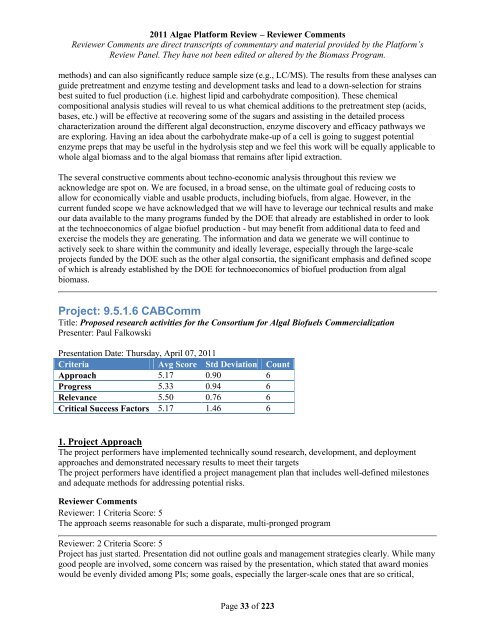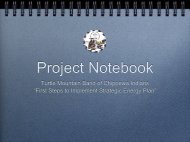Reviewer Comments - EERE
Reviewer Comments - EERE
Reviewer Comments - EERE
Create successful ePaper yourself
Turn your PDF publications into a flip-book with our unique Google optimized e-Paper software.
2011 Algae Platform Review – <strong>Reviewer</strong> <strong>Comments</strong><br />
<strong>Reviewer</strong> <strong>Comments</strong> are direct transcripts of commentary and material provided by the Platform’s<br />
Review Panel. They have not been edited or altered by the Biomass Program.<br />
methods) and can also significantly reduce sample size (e.g., LC/MS). The results from these analyses can<br />
guide pretreatment and enzyme testing and development tasks and lead to a down-selection for strains<br />
best suited to fuel production (i.e. highest lipid and carbohydrate composition). These chemical<br />
compositional analysis studies will reveal to us what chemical additions to the pretreatment step (acids,<br />
bases, etc.) will be effective at recovering some of the sugars and assisting in the detailed process<br />
characterization around the different algal deconstruction, enzyme discovery and efficacy pathways we<br />
are exploring. Having an idea about the carbohydrate make-up of a cell is going to suggest potential<br />
enzyme preps that may be useful in the hydrolysis step and we feel this work will be equally applicable to<br />
whole algal biomass and to the algal biomass that remains after lipid extraction.<br />
The several constructive comments about techno-economic analysis throughout this review we<br />
acknowledge are spot on. We are focused, in a broad sense, on the ultimate goal of reducing costs to<br />
allow for economically viable and usable products, including biofuels, from algae. However, in the<br />
current funded scope we have acknowledged that we will have to leverage our technical results and make<br />
our data available to the many programs funded by the DOE that already are established in order to look<br />
at the technoeconomics of algae biofuel production - but may benefit from additional data to feed and<br />
exercise the models they are generating. The information and data we generate we will continue to<br />
actively seek to share within the community and ideally leverage, especially through the large-scale<br />
projects funded by the DOE such as the other algal consortia, the significant emphasis and defined scope<br />
of which is already established by the DOE for technoeconomics of biofuel production from algal<br />
biomass.<br />
Project: 9.5.1.6 CABComm<br />
Title: Proposed research activities for the Consortium for Algal Biofuels Commercialization<br />
Presenter: Paul Falkowski<br />
Presentation Date: Thursday, April 07, 2011<br />
Criteria Avg Score Std Deviation Count<br />
Approach 5.17 0.90 6<br />
Progress 5.33 0.94 6<br />
Relevance 5.50 0.76 6<br />
Critical Success Factors 5.17 1.46 6<br />
1. Project Approach<br />
The project performers have implemented technically sound research, development, and deployment<br />
approaches and demonstrated necessary results to meet their targets<br />
The project performers have identified a project management plan that includes well-defined milestones<br />
and adequate methods for addressing potential risks.<br />
<strong>Reviewer</strong> <strong>Comments</strong><br />
<strong>Reviewer</strong>: 1 Criteria Score: 5<br />
The approach seems reasonable for such a disparate, multi-pronged program<br />
<strong>Reviewer</strong>: 2 Criteria Score: 5<br />
Project has just started. Presentation did not outline goals and management strategies clearly. While many<br />
good people are involved, some concern was raised by the presentation, which stated that award monies<br />
would be evenly divided among PIs; some goals, especially the larger-scale ones that are so critical,<br />
Page 33 of 223




